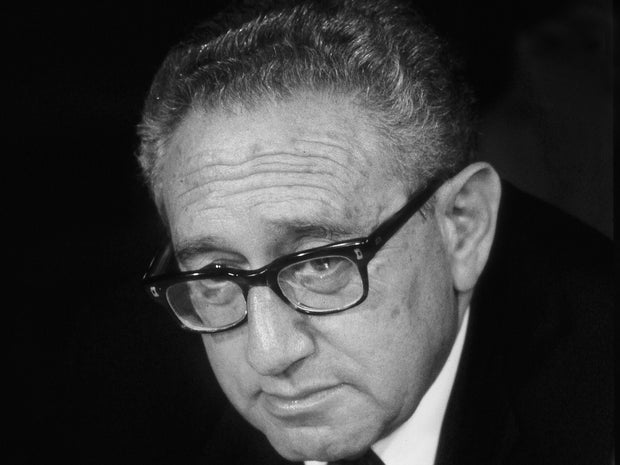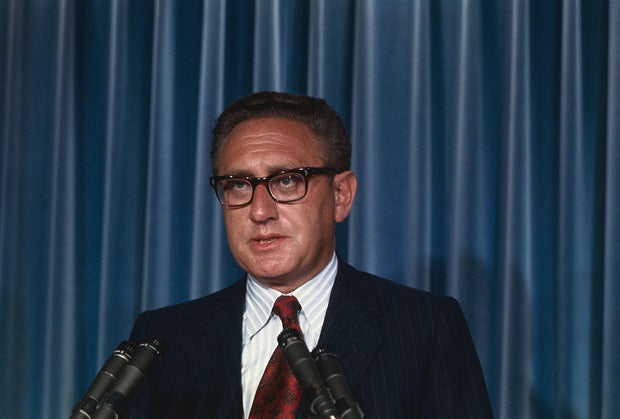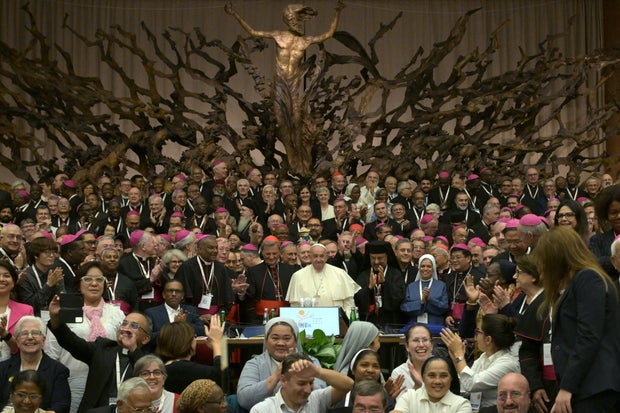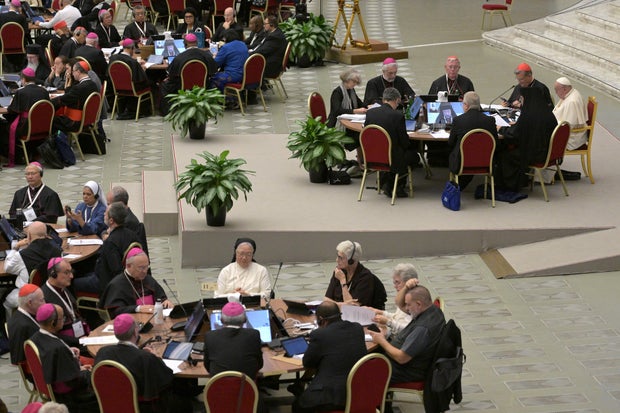CBS News
Henry Kissinger, controversial statesman who influenced U.S. foreign policy for decades, has died
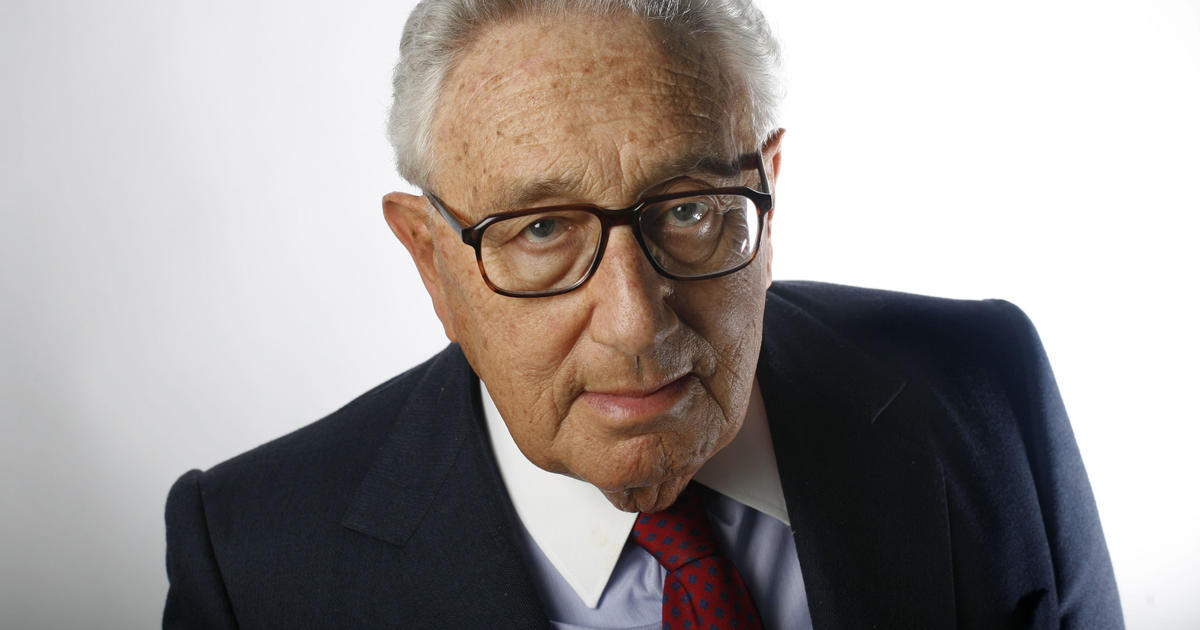
Henry Kissinger, one of the most influential and controversial diplomats of the 20th century, died Wednesday at age 100, his firm said.
Kissinger, who served as secretary of state and national security adviser under Presidents Richard Nixon and Gerald Ford, remained a prominent voice on foreign policy issues long after leaving government in 1977.
“I work about 15 hours a day,” he told CBS News weeks before he turned 100, saying with confidence that world leaders like China’s Xi Jinping or Russia’s Vladimir Putin would likely take his calls.
He was known for his practice of “realpolitik” — engaging with the world based on practical objectives rather than moral ideals — and was credited with the secret diplomacy that helped thaw U.S. relations with China. But he was also accused of alleged war crimes for the bombing of Cambodia during the Vietnam War, backing Pakistan’s genocide in Bangladesh, and green-lighting the Argentine dictatorship’s “dirty war” against dissidents.
He was born in Germany on May 27, 1923, as Heinz Alfred Kissinger. Less than three months before Kristallnacht, in 1938, his Jewish family fled Nazi Germany and resettled in New York City, where he became known as Henry.
Tom Starkweather/Bloomberg via Getty Images
After his first year at George Washington High School, he took night classes and worked in a shaving brush factory during the day, according to “Kissinger: A Biography“ by Walter Isaacson. After graduating, he enrolled in the City College of New York and planned to become an accountant. But he was drafted into the U.S. Army shortly after his 19th birthday.
Kissinger, who became a naturalized U.S. citizen in 1943, returned to his motherland as a German interpreter in the U.S. Army. He also arrested Gestapo members and helped liberate prisoners from the Ahlem concentration camp.
“I had not realized until I saw the camp, the depths to which human beings could be reduced,” he told the BBC in an interview that aired in July 2022.
He was awarded the Bronze Star for his time in the Army’s counterintelligence unit developing informants that led to the Gestapo arrests.
Upon his return to the U.S. after the war, he enrolled at Harvard, where his senior thesis on “the meaning of history” became legend, according to Isaacson’s biography. At nearly 400 pages, it was longer than any previous undergraduate thesis and reportedly brought about the “Kissinger rule” that limited the length of future students’ theses.
In the following years, Kissinger completed his doctorate at Harvard and joined the faculty. In 1957, he was named the associate director of Harvard’s Department of Government and Center for International Affairs. He was also a consultant to several government agencies, including the State Department.
In 1968, Nixon chose Kissinger to be his national security adviser and during his second term appointed him as secretary of state. Kissinger was the first to serve in both roles at the same time, and he retained both titles in the Ford administration after Nixon resigned.
John van Hasselt/Corbis via Getty Images
Kissinger’s outreach to the Soviet Union and China is widely viewed as reshaping the direction of the Cold War. He negotiated the Strategic Arms Limitation Talks and the Anti-Ballistic Missile Treaty with the USSR, lowering tensions between the two nuclear superpowers. And he opened backchannel talks between the U.S. and China in the early 1970s, leading to the establishment of formal diplomatic relations and Nixon’s historic visit to China in 1972.
His “shuttle diplomacy” also helped contain the 1973 Arab-Israeli war.
But his influence on other conflicts around the globe has been more controversial.
Kissinger played a key role in the U.S. carpet-bombing Cambodia during the Vietnam War, which killed thousands of civilians and helped enable the rise of the genocidal Khmer Rouge regime. Yet he also shared a Nobel Peace Prize in 1973 for his involvement in talks aimed at ending the Vietnam War.
Bettmann/Getty
Kissinger drew fierce criticism for other positions he deemed to be in American interests, including undermining a democratically elected government in Chile, which lay the groundwork for a military coup, and sending weapons to Pakistan’s dictator, whose regime slaughtered residents of what’s now Bangladesh. In 1976, when right-wing military leaders seized power in Argentina, Kissinger told them, “If there are things that have to be done, you should do them quickly.” Human rights abuses were rampant; tens of thousands of people were tortured, assassinated or “disappeared.”
“That’s a reflection of their ignorance,” Kissinger told CBS News in response to those who saw him as a war criminal. “It wasn’t conceived that way. It wasn’t conducted that way.”
After leaving government in 1977, Kissinger remained a prominent presence in foreign policy circles for decades. Even into his late 90s, he continued publicly weighing in on global events, consulting for business clients and privately advising American presidents.
“I’ve had the honor that I have been able to do sometimes little, and sometimes more important, things for 10 presidents, starting with Kennedy,” Kissinger said in a 2012 interview with CBS News. “I had a very friendly relationship with Bush 43. He invited me quite frequently to talk with him.”
More recently, he shared foreign policy advice with then-President Trump, who praised Kissinger’s “immense talent” at a White House meeting in 2017.
If a president were to ask him to talk with Putin amid the war in Ukraine, Kissinger, on the cusp of 100 years old, said he’d “be inclined to do it.”
“On behalf of our family, and of all those who worked with our father and Dr. Henry A. Kissinger in a partnership that produced a generation of peace for our nation, we express our deepest condolences on the passing of one of America’s most skilled diplomats,” Nixon’s daughters, Tricia Nixon and Julie Nixon Eisenhower, said in a statement.
Former President George W. Bush said in a statement Wednesday, “America has lost one of the most dependable and distinctive voices on foreign affairs.”
“He worked in the Administrations of two Presidents and counseled many more,” Bush wrote. “I am grateful for that service and advice, but I am most grateful for his friendship. Laura and I will miss his wisdom, his charm, and his humor. And we will always be thankful for the contributions of Henry Kissinger.”
Kissinger is survived by his two children, Elizabeth and David, from his first marriage, as well as his wife, Nancy, whom he married in 1974.
CBS News
Navy issues apology for destroying Alaska Native village in 1882
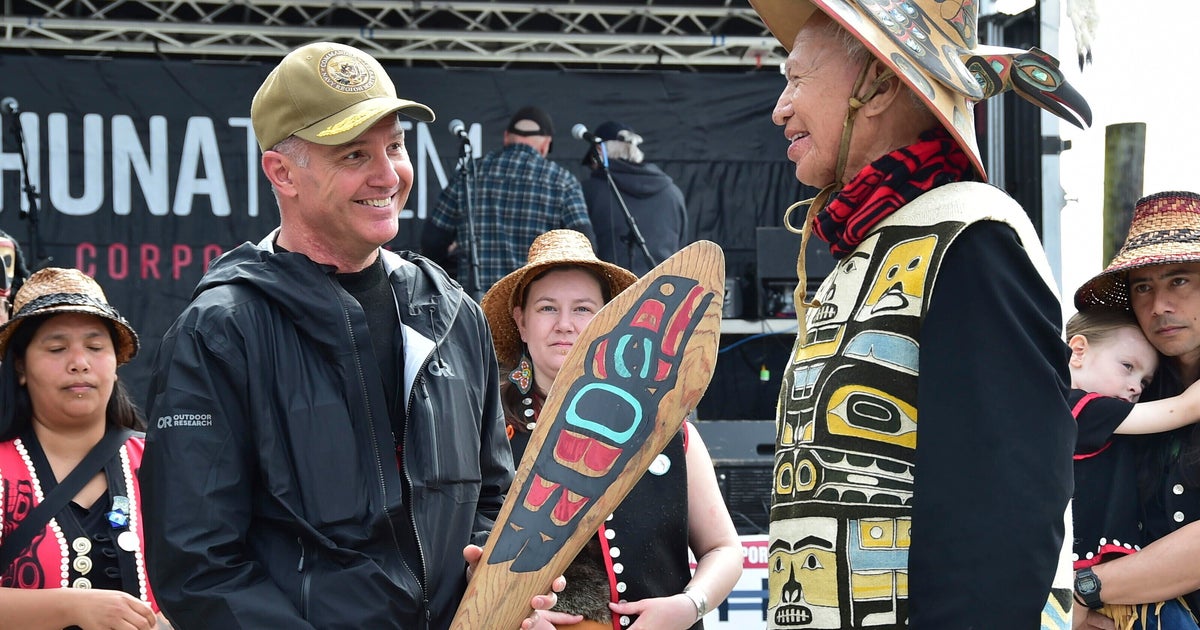
Shells fell on the Alaska Native village as winter approached, and then sailors landed and burned what was left of homes, food caches and canoes. Conditions grew so dire in the following months that elders sacrificed their own lives to spare food for surviving children.
It was Oct. 26, 1882, in Angoon, a Tlingit village of about 420 people in the southeastern Alaska panhandle. Now, 142 years later, the perpetrator of the bombardment — the U.S. Navy —has apologized.
Rear Adm. Mark Sucato, the commander of the Navy’s northwest region, issued the apology during an at-times emotional ceremony Saturday, the anniversary of the atrocity.
“The Navy recognizes the pain and suffering inflicted upon the Tlingit people, and we acknowledge these wrongful actions resulted in the loss of life, the loss of resources, the loss of culture, and created and inflicted intergenerational trauma on these clans,” he said during the ceremony, which was livestreamed from Angoon. “The Navy takes the significance of this action very, very seriously and knows an apology is long overdue.”
While the rebuilt Angoon received $90,000 in a settlement with the Department of Interior in 1973, village leaders have for decades sought an apology as well, beginning each yearly remembrance by asking three times, “Is there anyone here from the Navy to apologize?”
“You can imagine the generations of people that have died since 1882 that have wondered what had happened, why it happened, and wanted an apology of some sort, because in our minds, we didn’t do anything wrong,” said Daniel Johnson Jr., a tribal head in Angoon.
The attack was one of a series of conflicts between the American military and Alaska Natives in the years after the U.S. bought the territory from Russia in 1867. The U.S. Navy issued an apology last month for destroying the nearby village of Kake in 1869, and the Army has indicated that it plans to apologize for shelling Wrangell, also in southeast Alaska, that year, though no date has been set.
Chief Mass Communication Spc. Gretchen Albrecht/U.S. Navy via AP
The Navy acknowledges the actions it undertook or ordered in Angoon and Kake caused deaths, a loss of resources and multigenerational trauma, Navy civilian spokesperson Julianne Leinenveber said in an email prior to the event.
“An apology is not only warranted, but long overdue,” she said.
Today, Angoon remains a quaint village of about 420 people, with colorful old homes and totem poles clustered on the west side of Admiralty Island, accessible by ferry or float plane, in the Tongass National Forest, the nation’s largest. The residents are vastly outnumbered by brown bears, and the village in recent years has strived to foster its ecotourism industry. Bald eagles and humpback whales abound, and the salmon and halibut fishing is excellent.
Accounts vary as to what prompted its destruction, but they generally begin with the accidental death of a Tlingit shaman, Tith Klane. Klane was killed when a harpoon gun exploded on a whaling ship owned by his employer, the North West Trading Co.
The Navy’s version says tribal members forced the vessel to shore, possibly took hostages and, in accordance with their customs, demanded 200 blankets in compensation.
The company declined to provide the blankets and ordered the Tlingits to return to work. Instead, in sorrow, they painted their faces with coal tar and tallow — something the company’s employees took as a precursor to an insurrection. The company’s superintendent then sought help from Naval Cmdr. E.C. Merriman, the top U.S. official in Alaska, saying a Tlingit uprising threatened the lives and property of White residents.
The Tlingit version contends the boat’s crew, which included Tlingit members, likely remained with the vessel out of respect, planning to attend the funeral, and that no hostages were taken. Johnson said the tribe never would have demanded compensation so soon after the death.
Merriman arrived on Oct. 25 and insisted the tribe provide 400 blankets by noon the next day as punishment for disobedience. When the Tlingits turned over just 81, Merriman attacked, destroying 12 clan houses, smaller homes, canoes and the village’s food stores.
Six children died in the attack, and “there’s untold numbers of elderly and infants who died that winter of both cold, exposure and hunger,” Johnson said.
Billy Jones, Tith Klane’s nephew, was 13 when Angoon was destroyed. Around 1950, he recorded two interviews, and his account was later included in a booklet prepared for the 100th anniversary of the bombing in 1982.
“They left us homeless on the beach,” Jones said.
Rosita Worl, the president of Sealaska Heritage Institute in Juneau, described how some elders that winter “walked into the forest” — meaning they died, sacrificing themselves so the younger people would have more food.
Even though the Navy’s written history conflicts with the Tlingit oral tradition, the Navy defers to the tribe’s account “out of respect for the long-lasting impacts these tragic incidents had on the affected clans,” said Leinenveber, the Navy spokesperson.
Tlingit leaders were so stunned when Navy officials told them, during a Zoom call in May, that the apology would finally be forthcoming that no one spoke for five minutes, Johnson said.
Eunice James, of Juneau, a descendant of Tith Klane, said she hopes the apology helps her family and the entire community heal. She expects his presence at the ceremony.
“Not only his spirit will be there, but the spirit of many of our ancestors, because we’ve lost so many,” she said.
CBS News
Pope Francis’ Catholic church reform process ends without giving more equity to women
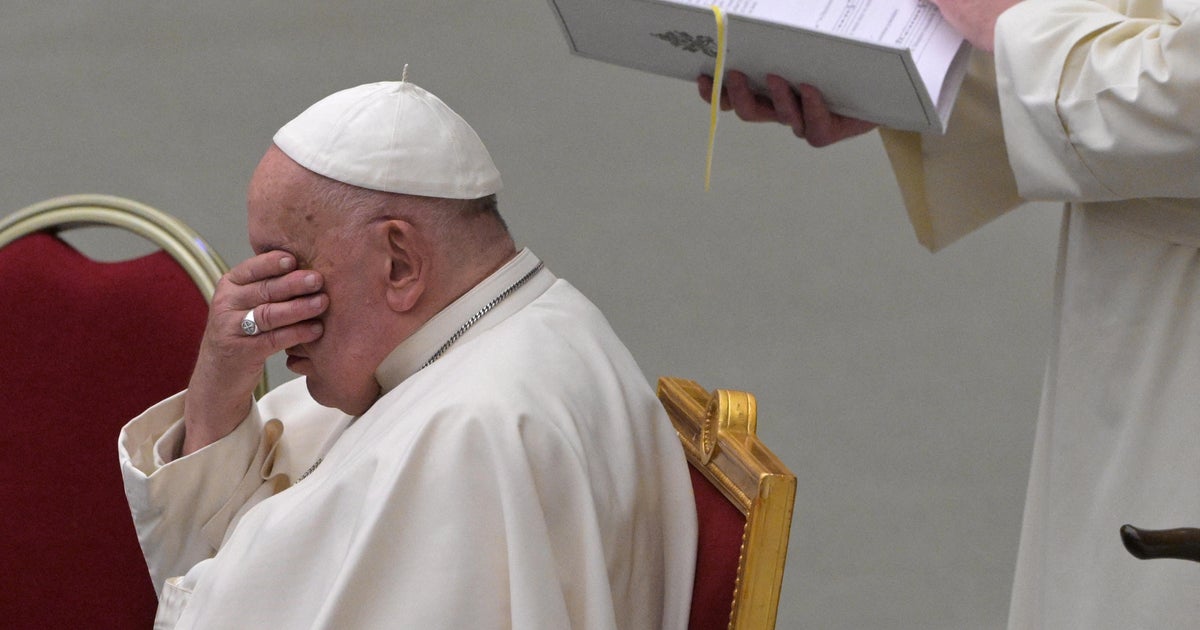
Pope Francis’ yearslong process to reform the Catholic Church closed Saturday with recommendations that fell short of giving women more equity as hoped but reflected the pope’s aims for a church that at least listens more to its followers.
In a significant move, the pope said he would not issue a teaching document from the recommendations, which called for women to be allowed all opportunities that Church law already provides while leaving open the contentious question of allowing women to be ordained as deacons.
As a result, it remains unclear what if any authority or impact the synod’s final recommendations will have, given the purpose of the exercise was to provide the pope with specific proposals on reform.
“In this time of war, we must be witnesses to peace” and give an example of living with differences, the pope said in explaining his decision.
TIZIANA FABI/AFP via Getty Images
Francis said he would continue to listen to the bishops’ counsel, adding “this is not a classic way of endlessly delaying decisions.”
Deacons perform many of the same functions as priests, such as presiding over baptisms, weddings and funerals, but they cannot celebrate Mass. Advocates say allowing women to be deacons would help offset the shortage of priests. Opponents say it would signal the start of a slippery slope toward ordaining women to the all-male priesthood that Francis has repeatedly reaffirmed.
Earlier this week, the Vatican’s top doctrinal officer, Cardinal Victor Manuel Fernandez, told the extraordinary assembly of 368 bishops and laypeople that Francis had said the moment “is not ripe” for allowing the ordination of women as deacons. He did not respond directly to a request to define what would determine “ripeness” for a greater role for women.
The multi-year synod process had sparked great hopes for change, especially for women, who have long complained that they are treated as second-class citizens in the church. Women are barred from the church’s highest ministerial positions, yet do the lion’s share of the work running Catholic hospitals and schools and passing the faith onto future generations.
Speaking to the synod on Thursday, Fernandez explained that a special working group would continue beyond the closing of the meeting, but that its focus would be on discussing the role of women in the church — not in the diaconate, or the office of deacon. He added that while working with women in previous pastoral roles, “most did not ask for or want the diaconate, which would be cumbersome for their lay work.”
The meeting asked for “full implementation of all the opportunities already provided for in Canon Law with regard to the role of women, particularly in those places where they remain under-explored.” It leaves open “the question of women’s access to diaconal ministry.”
TIZIANA FABI/AFP via Getty Images
It was the most contested paragraph of the final document, with 258 votes for and 97 against. It was not clear if the “no” votes were because the language went too far or not far enough.
The outcome is a disappointment for Catholics who have been campaigning for recognition that women share a spiritual calling that is no different than a man’s. They also noted that despite the inclusion of women in the synodal process, the working group that is guiding discussions on women’s role is being run by the Roman curia, operating outside the synod.
“I think the final document will be received with much disappointment and frustration by many women around the world who are hoping for concrete changes,” said Kate McElwee, the executive director of the Women’s Ordination Conference.
While she acknowledged a “cultural shift,” she said “the pace of that shift is perhaps too slow for many women.”
The first phase of the synod process ended last year by concluding it was “urgent” to guarantee fuller participation by women in church governance positions, and calling for theological and pastoral research to continue about allowing women to be deacons.
If before the synod the idea of allowing women to be deacons was a fringe proposal pushed by Western progressives, the idea gained attention during the debate. It became something of a litmus test of how far the church was going to go, or not, to address demands of women for greater equality and representation in the church’s highest ranks.
Francis, had other ideas, insisting that ordaining women would just “clericalize” them and that there were plenty of other ways to empower women in the church, even leading Catholic communities, without resorting to ordination.
CBS News
Jim Donovan, Cleveland Browns play-by-play announcer and TV sports anchor, dies of cancer at 68

Jim Donovan, the beloved radio play-by-play announcer for the Cleveland Browns and a TV sports fixture for more than four decades, died Saturday. He was 68.
Donovan retired from his broadcast career earlier this year and stepped away from his game-day duties with the team before this season while battling cancer. Donovan announced his retirement from WKYC on May 30 and worked his final broadcast as a sports anchor on June 10. He had called Cleveland’s games since the team’s expansion rebirth in 1999.
David Richard / AP
“This is an incredibly difficult day for us and the entire Cleveland Browns organization,” Browns owners Dee and Jimmy Haslam said in a statement. “His impact as the Voice of the Browns for 25 years is immeasurable as he touched the lives of our fans each and every Sunday with his love for the Browns and his brilliance at his craft.
“He will be greatly missed, but he cemented a legacy that will live on forever. The only thing that outweighed his love for this city and this team was the love he had for his family. Our thoughts and prayers are with his wife, Cheryl, his daughter, Meghan, and everyone who was fortunate enough to call Jimmy family or friend.”
A Boston native known to everyone as “Jimmy,” Donovan endeared himself to Cleveland fans with his passion, sense of humor and professionalism. He was a stickler for detail, spending countless hours preparing for game broadcasts.
Donovan had recently been inducted into the Browns’ Legends Club and the Greater Cleveland Sports Hall of Fame. He had been too ill to attend the events.
When he was forced to step down in August, Donovan wrote a letter to Browns fans expressing his gratitude for their support.
“I have called Browns games for 25 years. Not a day has gone by when I haven’t paused and been so proud to be ‘The Voice of the Browns,'” he wrote. “Cheryl, Meghan and I thank you for all the love, support and prayers during my rough patches. It’s like having a huge family around us. And that’s what makes the Cleveland Browns so special. You do.”
Donovan had to step away as sports director at WKYC-TV last fall for several months to undergo treatment for leukemia. He returned to the broadcast booth in time to call the team’s late-season run to the playoffs.
Donovan was first diagnosed with chronic lymphocytic leukemia, a strain of the disease that starts in white blood cells and affects bone marrow, in 2000. He underwent a bone marrow surgery in 2011.
A graduate of Boston University, Donovan got to Cleveland in 1985. Along with doing local reporting of the city’s three professional sports franchises, Donovan also had several national network assignments and was part of NBC’s coverage team at the 1992 and 1996 Summer Olympics.



